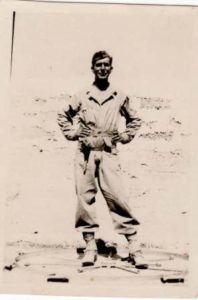“The Last Great Band Night” was the short story that got me into the MFA program at San Francisco State University back in 2000. I’ve never submitted it elsewhere and likely won’t in short story version. It did its job and I’m happy to let it go out on that note. However, I made a great story board for a novel treatment and will finish it after I do a few other dozen things. My dad, who fought in World War Two, was the inspiration for “The Last Great Band Night,” so it will always be a special story for me whether I publish it or not. If you’ve read my story “Shoeless,” you got a glimpse of him in the character Jake. Below is a little bit of the original “Band Night” story:
When the cops walked in Willie was still laid out across the pool table, holding his nose and asking for a cloth to stop it bleeding. Since no one in the place had called them, we all were surprised. We didn’t have our own police in Bruneau, and the county sheriff, who lived in Glenns Ferry, 18 miles away, had to come over whenever there was trouble. I guess there were police in Mountain Home too, which was still pretty near, but for some reason the call to Glenns Ferry had been transferred all the way to Boise because the sheriff was out of town visiting his in-laws. So the cops who came in the door that night were not known to any of us. They were both tall, and one was taller than my Dad, who was over six-foot. The cops stood in the doorway for a minute and took in the mess; someone got a wet towel for Willie and he dabbed at the blood under his nose. Young Dick came to and sat up, started to stand but changed his mind and settled back down on the floor. He was going to have one mighty shiner. Frank crawled out from his hiding place underneath the table but made sure to stay far away from my father. Dad looked like he was in a great mood.
Earlier that evening I climbed onto the old chest freezer so I could watch through the window and see the bar fill up. The thing I loved most about band nights was that I saw so many customers who I didn’t even know, folks who came in from Little Valley or Hot Springs or maybe further out of town. The window was a great place to see and hear everything that went on, and Dad let me sit up as late as I could keep my eyes open. No way I’d sleep anyway with all the noise, he said. The window was a leftover from when the place had been a diner, and Mom used to serve up hot orders through it from the kitchen side. With the freezer pushed against the wall, I could sit and lean on the window ledge and view the entire place.
Our place was a long low building made of gray cinderblocks, with three front windows and two front doors. The two windows and door on the right side were the bar, and the window and door on the left were the living part. The bar windows had neon signs, “Olympia on tap” and “Coors.” When you walked through the front door, the first thing you saw was my father on his stool behind the bar, the black cash register to the left behind him. There were 21 red-topped barstools and a swing-up gate at one end so you could carry things in and out. Behind the bar were more beer signs. The Oly sign had a waterfall made of lights so that when you turned it on it looked like the water was running.
We had the most beautiful yellow jukebox, with colored lights that came on when you played a song. When the place was closed, in the early mornings and on Tuesdays, Dad gave me a roll of quarters and let me play as many songs as I wanted. My favorite was “Blue Moon,” but if I played it too many times in a row he’d look up from washing beer glasses and say, “For Christ’s sake Maggie, pick another song.”
